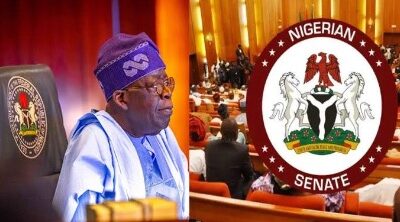Trending
Alleged Consumer Rights Violations: FG Sends Strong Warning To Air Peace Following FCCPC’s Probe

The Federal Government has cautioned Air Peace against obstructing an ongoing investigation into alleged breaches of consumer rights, including exploitative airfare practices. This warning was issued by Ondaje Ijagwu, spokesperson for the Federal Competition and Consumer Protection Commission (FCCPC), through a statement released on Sunday.
The warning follows Air Peace’s claim last Friday that the FCCPC’s allegations of exploitative pricing have unfairly harmed its reputation. The airline further accused the Commission of failing to follow due process in its investigation. Air Peace has asserted that domestic airfares should range between ₦500,000 and ₦700,000 per route, a pricing model that has drawn widespread criticism from consumers and regulatory authorities.
The FCCPC, however, dismissed Air Peace’s claims, stating that they appear to be a deliberate attempt to shift focus from the ongoing probe into the airline’s pricing practices.
The FCCPC revealed that consumer complaints against Air Peace center on the following issues:
Unjustified Fare Increases: Allegations of arbitrary price hikes for advance bookings on certain domestic routes.
Transparency Concerns: Lack of clarity in pricing structures.
Passenger Exploitation: Claims of arbitrary flight cancellations, delays without compensation, and surcharges for rescheduling tickets.
One complaint highlighted by the FCCPC challenges Air Peace’s justification for high fares. While Air Peace claims it spends ₦7 million on fuel for a one-hour flight, consumer petitions argue that a typical Boeing 737-500 used by the airline costs approximately ₦4 million to fuel. With 120 passengers paying an average fare of ₦200,000, the airline would generate ₦24 million per flight—far exceeding operational costs. At the proposed fare of ₦500,000, the revenue would soar to ₦60 million per flight.
The FCCPC noted that some competitors have reduced fares to as low as ₦80,000 for similar routes, demonstrating that affordable pricing and operational sustainability are achievable within the same market. This disparity has led to questions about Air Peace’s pricing model and whether the airline is influencing other carriers to raise fares.
Further compounding consumer frustrations, a recent incident at Abuja’s Nnamdi Azikiwe International Airport saw passengers protesting a four-hour delay on an Air Peace flight to Lagos. The chaos reportedly required security intervention to restore order.
The FCCPC emphasized its legal authority under the Federal Competition and Consumer Protection Act (FCCPA) of 2018 to investigate pricing practices across all sectors, including aviation. The Commission cited Sections 17, 33, 127, and 148 of the Act, which empower it to ensure that pricing is fair, competitive, and non-exploitative.
Responding to Air Peace’s assertions that only aviation regulators can oversee its operations, the FCCPC clarified that it is mandated to protect consumer rights, regardless of the sector. “Passengers are consumers of its services. Their rights are inalienable and guaranteed under the FCCPA,” the Commission stated.
The FCCPC reiterated its commitment to conducting a thorough investigation and warned that no amount of “blackmail or cowboy tactics” from Air Peace would derail its efforts.
The FCCPC reassured Nigerians that it remains resolute in its mission to promote market fairness, safeguard consumer rights, and foster transparency in the aviation industry. It called on the public to disregard unfounded media reports and trust in its ability to uphold justice.
As investigations continue, Air Peace and other stakeholders will need to cooperate with regulatory authorities to address these pressing concerns and ensure compliance with consumer protection laws.
Trending
Actress Doris Ogala reacts to Pastor Chris Okafor’s wedding, makes fresh explosive claims

Actress Doris Ogala has reacted strongly to Pastor Chris Okafor’s wedding, insisting that the public does not know what is really going on behind the scenes.
In a new outburst following reports of the wedding, Doris alleged that the marriage was forced, claiming the bride was r*ped and got pregnant and that the situation was allegedly used to prevent public exposure. According to her, the bride’s mother is his church’s choir coordinator and allegedly insisted on marriage to avoid scandal.
Doris further claimed that Pastor Chris had another woman he was allegedly set to marry on the 24th, adding that she has chats and videos she says support her claims. She described the situation as darker than it appears and said her decision to speak out was deliberate, despite the personal cost.
She maintained that her earlier confessions and allegations were part of what she described as a spiritual and personal reckoning, stating that she felt compelled to expose what she believes has been hidden.
https://www.instagram.com/reel/DSXz6ZLDMRY/?igsh=YjJyaHJ4bWNxdHg1
Trending
Kwara Govt Confirms Arrested Armed Men Are Miyetti Allah Members, Not Bandits

The Kwara State Government has provided clarification on the viral video showing armed men, initially believed to be bandits, being interrogated by soldiers, a development that had sparked widespread public anger and calls for a state of emergency.
The state official confirmed that the men apprehended were part of a security operation coordinated by the Federal Government, raising fresh controversy over the use of armed non-state actors in counter-insurgency efforts.
Speaking on Informant247, Ibrahim Abdulateef, Senior Special Assistant on Communication to the Governor, confirmed the arrested individuals were members of Miyetti Allah who were incorporated into a Joint Task Force following the deadly September 29 attacks in Ifelodun LGA.
“Under their security setup, they use both recognized officers and a JTF which includes members of Miyetti Allah and local vigilante networks,” Abdulateef said.
The controversy deepened as the state confirmed that a patrol vehicle was provided through the local government chairman “in a bid to empower security forces.”
The government denied the men were arrested as bandits in Kwara. Instead, Abdulateef alleged that after the men completed their assignment, they “absconded with the patrol van” and were subsequently arrested by soldiers “in Auchi, Edo State, not anywhere in Kwara.”
According to Sahara Reporters, the Chief Press Secretary to the Governor, Rafiu Ajakaye, further clarified the identity of an official named in the suspects’ confession: “Victor is a police sergeant attached to the NSA Office,” and not a DSS or Air Force officer as speculated.
Ajakaye disclosed that Victor and the vigilante operatives had since left Kwara State in line with the position of affected local communities, a decision the government said it respected.
He cautioned against sensational reporting of sensitive security matters, describing the situation as a “secrecy dilemma” that requires balance to ensure accountability without undermining national security efforts.
“We are going through a difficult phase in national security emergency. The pain of losing our brothers and sisters and of losing our peace of mind cannot be quantified. Losing a soul is a tragedy — much less many souls,” he said in a WhatsApp post.
He called for calm, urging political elites and community leaders to act with tact and responsibility amid rising tensions.
“But statesmen and patriots aren’t known in time of peace and ease. The elite (who shoulder the burden of guiding the masses) need to handle these whole things with a lot of tact and patriotism,” he said.
“May God guide us, restore peace in our land, expose the evil doers and their collaborators, and make our country stronger, more peaceful, and more prosperous,” the CPS added. “This is a time for careful leadership, not reckless accusations.”
The state’s confirmation of the use of Miyetti Allah members in armed operations comes after previous reports highlighted strong opposition from Kwara residents and local Fulani leaders to an alleged plan by the National Security Adviser (NSA), Nuhu Ribadu, to deploy and arm Fulani herders (Bororos) with AK-47 rifles to fight banditry.
Local Fulani stakeholders had warned that arming non-state actors could worsen insecurity, citing the failure of similar previous attempts and the volatility of migrant herders.
Both the Kwara State Government and Miyetti Allah initially denied any arrangement involving the arming of herders or collaboration with bandits.
Trending
4 Rushed To Hospital as Aircraft Crash-Lands at Imo Airport
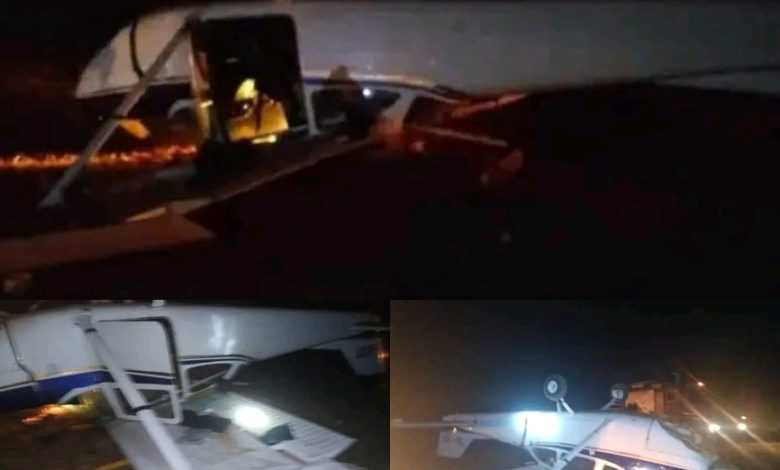
By Dan Opara
A light aircraft, Cessna 172, operated by Skypower Express, crash landed on Tuesday night, December 16, 2025, at the Sam Mbakwe International Cargo Airport, Owerri, Imo State, resulting in the hospitalization of four persons.
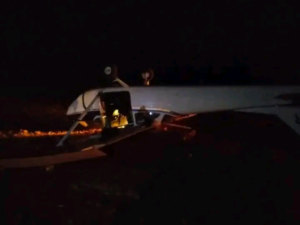
Eyewitnesses said the aircraft encountered difficulties during landing, lost stability on the runway, and subsequently somersaulted before coming to a halt within the airport premises.
The incident triggered panic among airport personnel and onlookers, although no lives were lost.
Emergency response teams were swiftly deployed to the scene, where the injured occupants were rescued and immediately transported to a nearby medical facility for urgent treatment.
Airport officials confirmed that the four victims are currently receiving medical care, and their condition was described as stable as of the time of filing this report.
The Nigerian Safety Investigation Bureau, NSIB, has commenced a formal investigation into the incident to ascertain both the immediate and underlying causes of the crash landing.
The investigation is expected to focus on the aircraft’s technical condition, prevailing weather conditions, pilot actions, and other operational factors surrounding the occurrence.
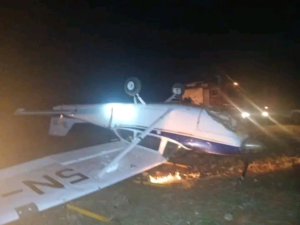
Following the accident, airport operations were temporarily disrupted, but normal activities were later restored after safety officials secured the affected area.
Authorities at the airport assured the public that all necessary safety measures are being strengthened to prevent a recurrence.
Meanwhile, stakeholders within the aviation sector have expressed concern over the incident and called for a comprehensive and transparent investigation to further enhance aviation safety standards in the country.
Ekwutosblog gathered the report through monitored information circulating on social media, as prayers and goodwill messages continue to pour in for the quick recovery of those hospitalized, while the public awaits the outcome of the NSIB investigation.
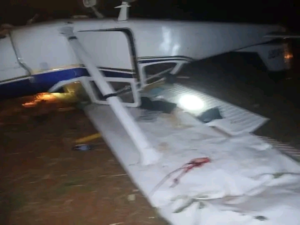
-
Business1 year ago
US court acquits Air Peace boss, slams Mayfield $4000 fine
-

 Trending1 year ago
Trending1 year agoNYA demands release of ‘abducted’ Imo chairman, preaches good governance
-

 Politics1 year ago
Politics1 year agoMexico’s new president causes concern just weeks before the US elections
-

 Politics1 year ago
Politics1 year agoPutin invites 20 world leaders
-

 Politics1 year ago
Politics1 year agoRussia bans imports of agro-products from Kazakhstan after refusal to join BRICS
-
Entertainment1 year ago
Bobrisky falls ill in police custody, rushed to hospital
-
Entertainment1 year ago
Bobrisky transferred from Immigration to FCID, spends night behind bars
-
Education1 year ago
GOVERNOR FUBARA APPOINTS COUNCIL MEMBERS FOR KEN SARO-WIWA POLYTECHNIC BORI









